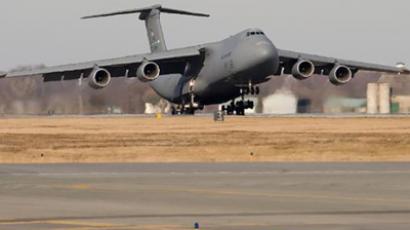Air Force punished whistle-blowers for exposing mishandling of the fallen

For exposing the US military’s mismanagement of body parts at the Armed Forces’ mortuary in Dover, Delaware, whistle blowing almost cost four civilian workers an arm and a leg.
An investigation has revealed that those that exposed the misconduct were disciplined for doing so. Revelations last year that the United States’ primary mortuary for its war dead was grossly mismanaged caused outrage after word got out that neglect at the Dover Air Force Base routinely resulted in the loss of body parts. Three staffers at the base were put under investigation for “gross management” and the Department of Defense was stuck dealing with massive damage control after the families of slain soldiers questioned if their loved ones were among those whose limbs had been lost by the Air Force.But as officials were tasked with handling the firestorm that erupted out of the revelations at Dover, among the routes they took for responding was disciplining the civilian whistle-blowers who clued the rest of the country into the misconduct."We applaud the whistle-blowers for their courage in coming forward," says Carolyn N. Lerner of the Special Counsel’s Office in a statement released this week. "We expect the Air Force will now take appropriate steps to discipline the wrongdoers and deter future acts of retaliation.”The Office of Special Counsel announced on Tuesday that it was asking the Air Force to take further actions against the three staffers who oversaw the outrageousness at Dover after learning that they sought to fire two of the whistle-blowers and managed to actually have others suspended and placed on indefinite leave. Air Force Secretary Michael Donley responded to the news on Tuesday by asking for a review of the investigation by the Office of Special Counsel, who initially investigated the mismanagement charges in November. “I believe strongly there is no place for reprisal in the Air Force,” Donley said in a statement. “Reprisals against employees are unethical and illegal and counter to Air Force core values.”The Washington Post reports that two of those supervisors who sought disciplinary action for the whistle-blowers are still employed at Dover, despite being held accountable in part for the mismanagement nearly three months earlier.Three of the supervisors that oversaw the misconduct have since taken different positions.During the Special Counsel’s Office investigation of the initial reports of misconduct in November, they wrote at the time that the Air Force had a pattern of failing “to acknowledge culpability for wrongdoing relating to the treatment of remains of service members and their dependents.” As the Special Counsel begins a new investigation of the supervising staff, it appears as if wrongdoing is still rampant within the ranks of the Air Force.The Office of the Special Counsel says they will try to reverse the unjust disciplinary actions suffered by those who brought the incident to light. "Because OSC found retaliation, it now seeks corrective action for the whistleblowers and disciplinary action against the agency officials who engaged in prohibited personnel practices," the statement read. "OSC is working with the Air Force to provide relief to these whistleblowers."Findings last year revealed that around “every two years” the mortuary would lose body parts of wartime casualties. Both the OSC and the Armed Forces conducted separate investigations. In those findings, one unnamed employee acknowledged that “it was kind of hard to keep track of everything.”In all, 14 sets of allegations of mismanagement were reviewed in the Air Force investigation, including once incident where a fallen Marine’s arm bone was sawed off so that the soldier could be fit into his casket.














